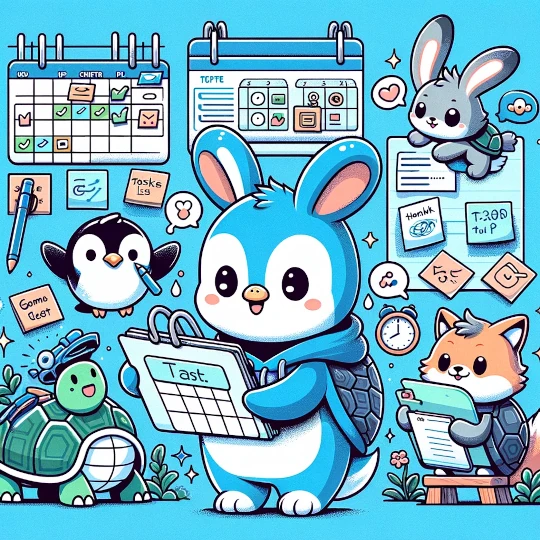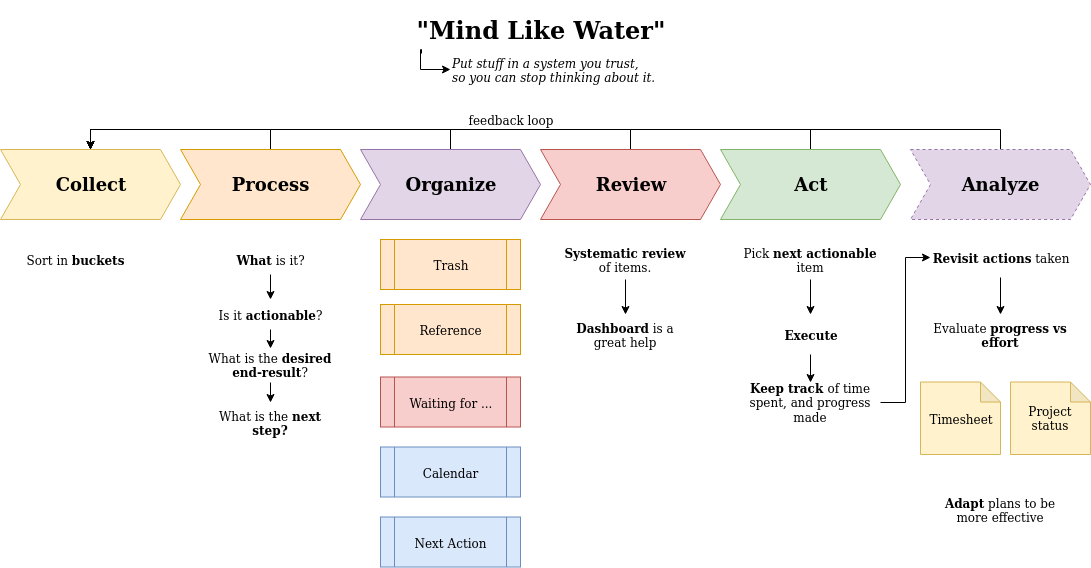Organize your workflow
Meta Info

In recent years, Microsoft has pivoted towards providing office-as-a-service applications. Most if these can be easily incorporated into your personal workflow. Having everything online makes it easier to be productive, without losing your mobility.
Problem Statement
You find it difficult to remember what you want to achieve, and are distraught by the amount of tasks you have yet to finish.
Intent
- Find peace of mind by offloading your ideas and tasks to an external system.
- Habitually use your tracking system to stay on top of your tasks, and ideas.
- Experiment and find a knowledge/task storage system that fits your lifestyle.
Contextual forces
What is this? These describe factors at play that influence the outcome of the practice. They are not necessarily good or bad, but they are important to be aware of. Some contextual forces are enablers, giving the practice a higher chance of being useful. Others are deterrents, making the practice less useful in your given context.
- People are often distracted by their own thoughts.
- Having mental “open loops”1 is tiring, and stressful.
- It is difficult to keep up the habit of organizing your ideas.
- Most productivity applications and techniques force you into a particular set of tools.
Enablers
The following factors support effective application of the practice:
- You are able to write relatively quickly.
- You are able to think critically of the ideas you have.
- You can plan your time expenditure in advance, and are disciplined enough to stick to it (mostly).
- You have a device that you bring with you to most places, or have a toolset that you can access from anywhere.
Deterrents
The following factors prevent effective application of the practice:
- You have little control over how you spend your time.
- Even though you plan events, they usually fall through.
- You have a particularly difficult time picking up new habits.
- You tend to change your system too often, not allowing yourself to get used to it.
- You are not able to note down your thoughts quickly (slow writing speed, analysis-paralasys).
- You generally spend more time refining your methods, or toolset, rather than focussing on the things you want to do.
Solution
Use a personalized productivity flow, using whatever tool (or combination of tools) you feel comfortable with. Make sure your chosen toolset is readily available, and trustworthy. For some, this will be a pen-and-paper system. Others prefer to leverage their digital prowess and lifestyle to have their productivity tool available to them constantly2.
Whichever tools you choose, make sure you:
- Have a specific location to dump out your thoughts
- Regularly review your brain dump tool and curate it. Some of your ideas will be crappy. Get rid of them.
- You should trust your tools. Peace of mind only happens when you are convinced your ideas and to-dos are stored reliably.
- Categorize and Prioritize your thoughts after you have collected them
- The Eisenhower Matrix (described below) is an excellent technique to do this
- differentiate between “things to remember” and “things that require action”
- assign “due dates” if able
Mind like water
One of the most popular personal productivity methods is called the “Getting things done” method3. The core ideas of the GTD approach is to have:
- A place to note down ideas or tasks that pop into your head
- A way to organize these by priority or type of work to do
- A calendar to plan time-allocations in
Examples
Personal productivity flow using MS online tooling
In recent years, Microsoft has pivoted towards providing office-as-a-service applications. Most if these can be easily incorporated into your personal workflow. Having everything online makes it easier to be productive, without losing your mobility.
Due to its online nature, this work in in perpetual motion. This section has not yet been completed. If you are interested in adding content here, please refer to the “How to contribute” guide on GitHub.
Further Exploration
- Allen, D. (2015). Getting Things Done: The Art of Stress-Free Productivity. Penguin Books. isbn: 0143126563.
https://www.goodreads.com/book/show/22573850-getting-things-done. - Covey, S. R.; Collins, J. (2004). The 7 Habits of Highly Effective People: Powerful Lessons in Personal Change. Free Press. isbn: 0743269519.
https://www.goodreads.com/book/show/36072.The_7_Habits_of_Highly_Effective_People. - Unknown (2023). What is the Eisenhower Matrix?. productplan.com.
https://www.productplan.com/glossary/eisenhower-matrix/.
An “open loop” is any task, idea, or though that keeps you occupied. You have not yet taken action on it, and as such were not able to come to a satisfying conclusion. In short: thoughts that live in your mind, for which you were not yet able to find closure. ↩︎
Unless of course your computers die and your internet connection goes on hiatus ↩︎
From the book ‘The 7 Habits of Highly Effective People: Powerful Lessons in Personal Change’ by Stephen R. Covey ↩︎
